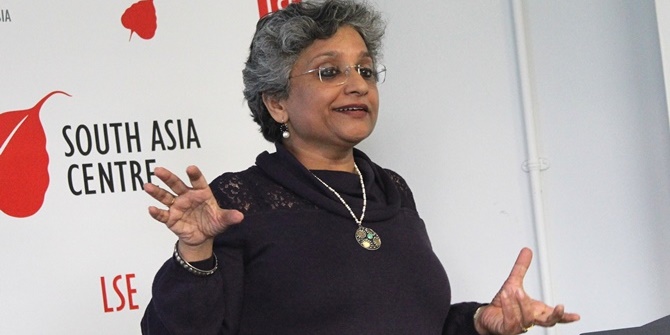Hemal Shah highlights the challenges in initiating and implementing market-friendly labour laws, and argues that labour legislation should shift from the Concurrent List to the State List. This post first appeared on The Broad Mind.
India has one of the world’s largest work forces employed in the informal sector. The roughly 400 million informal employees that make up 93 per cent of the total workforce strongly mirror the country’s burdensome labour regulation, which is archaic and has become increasingly restrictive. In 1976, firms employing more than 300 people needed government permission to effect lay-offs, retrenchments and closures. In 1982, this was further restricted to firms employing more than 100 workers, adding to the difficulty of hiring new or seasonal workers, and firing inefficient workers. With about 47 Union laws and 157 State regulations that overlap, budding entrepreneurs face regulatory confusion and are forced to remain small and informal to avoid the mess. Workers also end up with low-quality livelihoods and limited social security coverage.
So why has there been no reform in this area? Reform measures proposed at the central level have been constantly shot down by parties whose vested interests lie in an inflexible market, including persuading the trade unions wings of all political parties in the coalition. To break this historical impasse, I discuss interim, less-sensitive reforms in a new report for the Takshashila Institution.
Currently, labour is an item on the Concurrent List, which means that State governments can only make amendments to some central statutes, and also add new State statutes to a certain extent. Perverse incentives from this arrangement encourage States governments to be lax, to procrastinate, and defer to the Union. On the contrary, individual states are better at tweaking labour laws to balance flexibility and security with respect to their political economy. Would employers and employees benefit if labour legislation were moved entirely to the State List?
Some states – Andhra Pradesh, Gujarat, Karnataka, Madhya Pradesh, and Maharashtra – actively wish to make labour laws more flexible to allow choice and opportunities for employees by allowing, for instance, flexibility in work hours, night shifts for women, or freedom to fix minimum wages. They would not have to succumb to New Delhi politics if they proposed an amendment to move Article 246 under the Constitution’s Seventh Schedule – covering industrial disputes and social welfare – to the State List. This would possibly be less arduous politically than any attempt to pass reforms at the Union level. Moreover, the 2012 Labour Bureau report also acknowledges that, “some of the states having pro-labour-rights policies have not performed well in terms of unemployment rate… It may perhaps be advisable for the State Governments to take cognisance of inter-state differences in framing labour-market policies.”
For example, when the Union was debating whether to introduce Voluntary Self-Certification (VSC) in the eleventh Five Year Plan, some states waited hesitantly. But Gujarat decided to go ahead with it. VSC allows firms to register their compliance of labour regulation and avoid inspector raj and unnecessary litigation in exchange. In a 2011 paper for the World Bank, Professor Bibek Debroy explained that these certificates could be issued by “third party inspections with regulatory compliance certified by external recognised agencies.” Punjab, Rajasthan and Maharashtra are also trying to capitalise on VSC but there is often a tendency to pass such reforms in small enclaves, like special economic zones, to prevent straining relations with the Union too much.
From the limited power accorded to states, Gujarat has also taken the initiative to amend the Industrial Disputes Act to allow retrenching workers but only at a higher compensation of 45 days’ pay. Workers can also be hired on “fixed term” – different from contract workers – to satisfy work needed to be done for short periods. It is no surprise that 75 per cent of formal enterprises are concentrated in proactive states like Gujarat, Maharashtra, Delhi, Tamil Nadu, Andhra Pradesh, and West Bengal. Another popular reform that could increase flexibility for production units is to limit the number of registers to be maintained to two years, and allow the move from manual to electronic formats. But that proposal has been sitting in the Rajya Sabha since 2005 and no action has been taken so far.
On the other hand, Professor Debroy also warns that state freedom could be used adversely. For instance, from the leeway that states currently enjoy, some states have imposed restrictions that prevent employing women outside of ‘regular’ work hours adversely affecting establishments like call centres (Shops and Establishments Act). Some have also attempted to make the Factories Act further archaic by, for example, requiring red-painted buckets with sand because fire extinguishers won’t do. In other states, factories are not allowed to use modern computerised records necessitating the use of manual muster rolls for the fear of substituting technology for jobs. However, eliminating such rigid rules and instead training people to use technology could result in boosting good quality jobs and productivity rates, which is the need of the hour.
Competition is key in driving states to distinguish between what works and what does not. Indices like the TeamLease labour ecosystem index exemplify how some states are differentiating themselves to the extent they can. The 2009 index shows Andhra Pradesh and Karnataka beating Delhi and Gujarat for the top spots on overall labour ecosystem, but several others who are improving on the different variables of their sub-indices that include strikes and lockouts prevention, labour participation rate, and inspector raj. The continuous change in state rankings from previous years on the index and its sub-indices indicate how differentiation and competition are playing out.
Given the challenges that the Union faces in initiating and implementing market-friendly legislation, and the opportunities in expanding federal freedom, there is a clear case to be made to move labour legislation from the Concurrent List to the State List.
For more information on this topic, see the research report, “Towards greater labour market flexibility: Issues and options” for the Takshashila Scholars Programme.
Hemal Shah completed this report while a scholar at the Takshashila Institution. She is now a research assistant at the American Enterprise Institute in Washington D.C., and tweets @hemalshah_7. Hemal completed her Masters in Development Studies from LSE in 2010.








